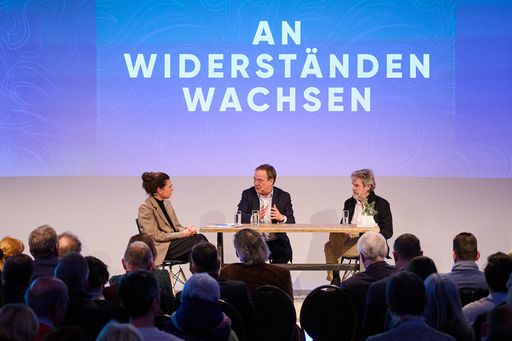One thing in advance: Anyone who expected a big reckoning with Markus Söder from Armin Laschet’s announced analysis of failure and headwind that evening was rather disappointed. In the “Oktogon” at the Zeche Zollverein in Essen, which was filled to capacity, the guests nevertheless experienced a highly entertaining discussion between the former CDU candidate for chancellor and mountaineering legend Reinhold Messner. Under the title “Growing through resistance” a plea for courage and humanity emerged, accompanied by a commitment to a culture of failure.
Although they lived in very different worlds, the stories of these two unusual personalities had numerous similarities, starting with a formative father figure. Nevertheless, Armin Laschet highlighted the crucial difference: “Failure in my case was not as existential as it was for Reinhold Messner.” While the commitment to the community exemplified by his parents was the central motivation for the Aachen native, Messner primarily wanted to explore the limits of human achievement.
Nothing is impossible!?
“Hermann Buhl, the first climber of Nanga Parbat, described climbing the Rupal Face, the highest steep face in the world, as impossible. My brother and I managed it anyway.” Günther Messner died during the descent – his brother Reinhold is still held responsible for this today. “In the fight against the public, I achieved an unparalleled level of self-empowerment,” says Reinhold Messner, describing his personal growth through resistance. “I continued with all radicalism.” By the way, he failed more often than anyone else when attempting to summit the world’s 14 eight-thousanders, thirteen times according to his own account…
“My motivation has always been to achieve what others have defined as impossible.”
Reinhold Messner
Armin Laschet’s professional life line in wave form always drove him to keep going: “It always goes up and down.” After winning a direct mandate for the Bundestag in 1994, he lost his constituency again in 1998 when Helmut Kohl was voted out. After five years as NRW minister, the 2010 election defeat was followed by defeat in the fight for the NRW chairmanship. The high point in 2017 with the election as Prime Minister preceded the low point in the 2021 candidacy for Chancellor. Laschet: “The defeat was extremely close at 24 to 26 percent. If it had been 15 to 30, I would probably have withdrawn from politics.”
“Politics doesn’t work in the mountains”
In a conversation with journalist Dagmar Rosenfeld, the two highlighted the crucial difference between politics and mountaineering, based not only on their shared experiences (they sat in the European Parliament from 1999 to 2004). “In politics you are always dependent on others,” said Laschet. Messner’s counter-speech: “Politics doesn’t work on the mountain. You can’t make a compromise at 8,000 meters, you have to make a decision and enforce it.” Nevertheless, he views Laschet’s field of activity with respect: “Politics is a necessity, we need a functioning democracy. What we are doing is useless and decadent.”
“We need a culture of failure and getting back up again. Maybe it will work the 10th time!”
Armin Laschet
Looking back and forward, mountaineers and politicians called for more courage to fail; this is the only way to recognize mistakes and avoid them in the next attempt. Instead of encouragement, current policy is characterized by a growing mountain of regulations with the aim of limiting risks, such as “six different helmets for children” (Laschet). In the Brost Foundation’s “Ruhr Nature” project, the extreme athlete acts as a sponsor and gives students from the Ruhr area a “haptic nature experience” when they visit South Tyrol, where they can experience themselves. Children from Duisburg and Essen who took part were allowed to ask Messner and Laschet the final questions via video link. Still moved by making Tibetan prayer flags together at Juval Castle in Vinschgau, they wanted to know, among other things, what future wish the two of them would write on their flag. While Laschet wants to “preserve the good that we have, preserve Europe and end the wars,” Messner wants: “Empathy must increase and egoism must decrease. Unfortunately, it is currently the other way around in all European countries.”
Hopeful words, accompanied by applause, at the end of an encouraging evening.
